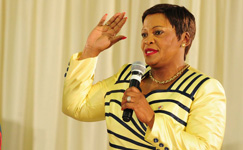South Africa aims for more women in water sector
Melissa Javan
2 September 2015
The conversation needed to be changed, according to Nomvula Mokonyane. The
water and sanitation minister spoke at a conference in Pretoria on Monday on
getting
women, who were breadwinners of households, to be providers in national sectors.
"How do we inform, incentivise and invest in women-owned businesses and
women leaders in water and sanitation," she asked delegates at the National
Women in Water Consultative Conference, where she encouraged them to change
the conversation.
"How do we change the debate from one of victimisation to one of
transformational leadership… We are here to create wealth and prosperity."
Mokonyane spoke of women who walked for more than an hour to fetch water
for their households. "An old lady said she was raped along the way. But that will
not stop her from fetching water," she said.
More than 200 million hours were spent each day around the world on
fetching
water. Businesspeople, Mokonyane urged, should not forget people like the women
fetching water for their families.
"Water is perceived to be a women's business but the business of water lacks
women." She was planning to shape the Department of Water and Sanitation.
"Women should not only fetch water for their households, but they must also be
suppliers of pipes and manage reservoirs."
Mokonyane wanted women to be part of the planning, designing and
implementation processes of things such as building dams or toilets.
New programme
For this reason, her department had launched the three-year national Women in
Water Programme. "The programme comprises a mentorship programme, a women
in water business incubator and a women in water forum. The scope of the
programme covers all women-owned businesses that are competent and excellent
in the provision of services to the department."
It would also focus on women in science and
engineering, those in innovation,
those in construction, and women in local community initiatives. Other businesses
owned by women may be considered based on merit.
Mokonyane said the first incubators would be made known in January 2016.
Other speakers
Female speakers addressed the conference commission sessions, during which
the audience could engage with the speakers and give their input on topics like
science and engineering, innovation, construction and local community initiatives.
In the construction commission, Dr Thandi Ndlovu, chief executive officer of
Motheo Construction Group, said the money the government pumped into
infrastructure had been reduced. Despite this, she felt the concern of the country
was what would happen to women.
The government policy was that at least 30% of its business should go to
women-headed companies. Ndlovu said it was important to have a niche for
yourself. "Look for the low-hanging fruit.
Dams will be built by the grade 9
contractors. Don't expect to build a dam if it's not your niche."
She also said the value of partnership was very important in making your
business succeed.
Khungeka Njobe, the chairperson of South Africa's Technology Innovation
Centre and Aveng Water, said before she had started a business, she asked herself
how she could do things differently from what was on the market.
She agreed that forming partnerships in business was vital. "Before
partnerships, it starts with relationships. Partnerships must be complementary, not
just about who you know. We got to know our strengths and skills [before entering
a partnership]."
She also said that investing should not be postponed. "We'll keep on saying we
do not have the skills. To understand the situation better, investment in things like
research should be done."
 Women should not only be providers at home, but should also be involved in planning, designing and implementing infrastructure in national sectors, says Water and Sanitation Minister Nomvula Mokonyane. (Image: The Presidency, via Flickr.com)
Women should not only be providers at home, but should also be involved in planning, designing and implementing infrastructure in national sectors, says Water and Sanitation Minister Nomvula Mokonyane. (Image: The Presidency, via Flickr.com)




